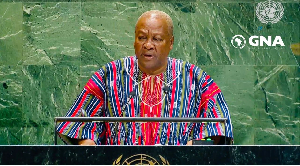He has just received his PhD degree from the Atlantic International University, Hawaii, USA, and as part of the recommendations of his thesis Nana Owusu Afari, former AGI president, has proposed the establishment of a ministry for small businesses.
The National Board for Small Scale Industries (NBSSI), he argues, should be up-graded to an Authority with the necessary logistics to help formalise the informal sector through further research and development.
“This should be a precursor to preparing the ground for establishing a Ministry of Small Business,” the Afariwa Group CEO said while sharing highlights of his thesis with a gathering of his friends in industry and politics who turned up at an event organised by the AGI to honour him for his achievements.
“…I remember that the fisheries department was just a department under the Ministry of Agriculture. The government realised that aquaculture and fisheries development is necessary so they created the Ministry for Fisheries and Aquaculture Development,” Nana Owusu Afari said.
“Now we in the business sector are also saying that the time has come to seriously think of establishing a ministry to take over the affairs of all these people who are going about calling themselves businessmen from their boxes.”
Titled “Formalising the informal sector in Ghana,” Nana Owusu Afari’s doctoral thesis finds that there are major barriers to formalisation of businesses in the country, including the high cost involved by way of permits and taxes, as well as the chain of regulations and bureaucratic bottlenecks.
The findings show that there is low motivation for informal business operators to formalise, as some 88% of respondents in the study said they had not registered their businesses -- while 44% said they had no plans whatsoever to register, let alone put systems in place.
While 46% of respondents had a business operating permit, only 3 percent of respondents paid VAT and SSNIT contributions respectively, while 5 percent paid property rates; 12 percent paid market tolls and 31 percent paid nothing.
“The registration of informal sector businesses should be done through recognisable business associations. This must be made mandatory to help regulate operations in the informal sector,” Nana Owusu Afari recommended.
“The Registrar-General should continue to decentralise its operations to the district level. Small Business Owners Groups could be set up to receive free regular training and business facilitation workshops under the NBSSI Authority and the new ministry,” he said.
“More specialised market centres and trading clusters should be created. Standard kiosks should be designed and placed at designated and approved locations for traders to rent,” he added.
Business News of Monday, 6 June 2016
Source: B&FT













